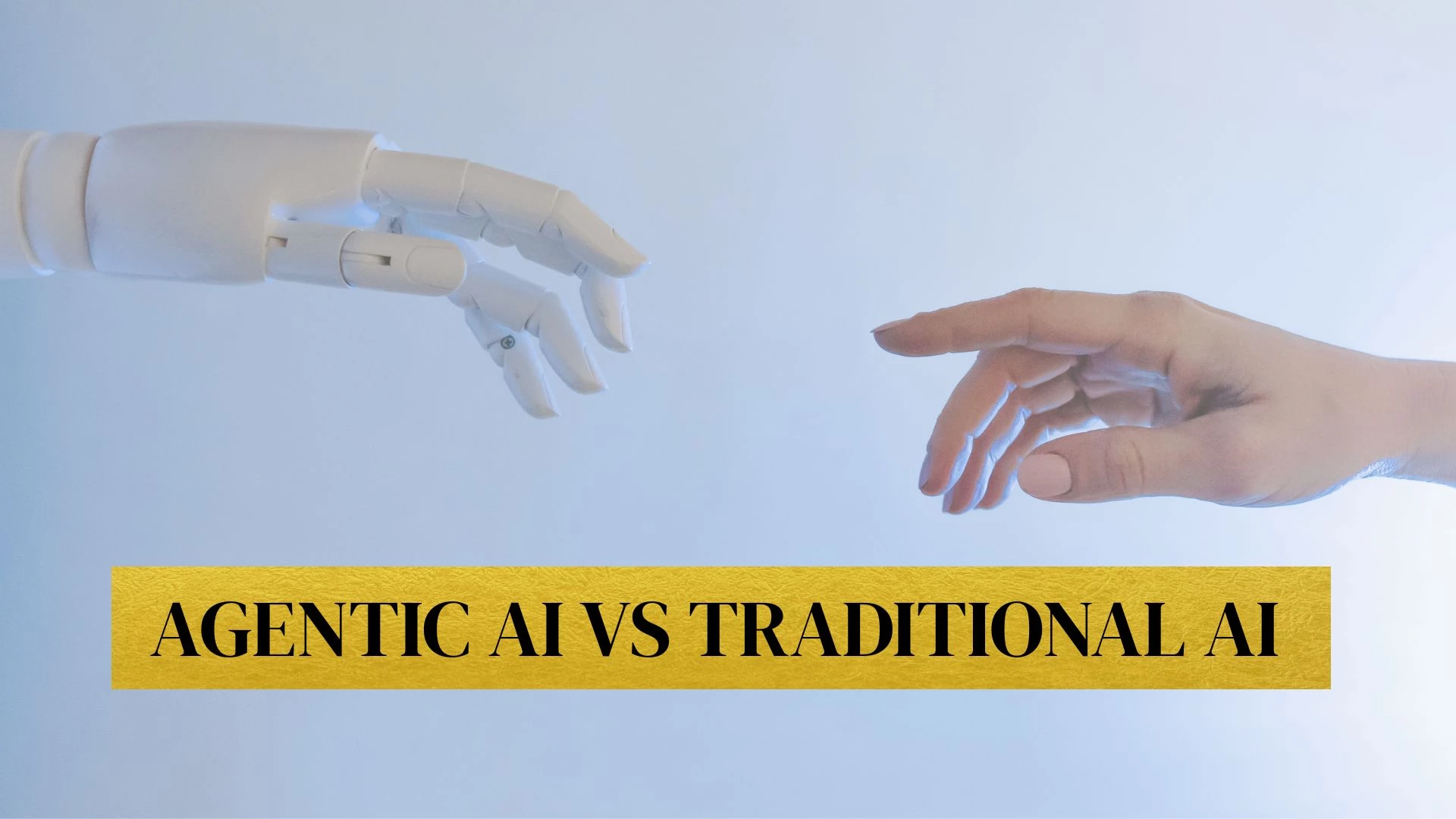Agentic AI are the next big thing in the AI industry. A report byGartner states that, 33% of enterprise software applications will include these next-gen AI models by 2028, up from less than 1% in 2024. But what are Agentic AIs? They are models that are equipped with ability to make decisions with almost human like reasoning and reach goals assigned to them. While traditional AI systems are limited by the inputs provided, data that they have and predefined rules, agentic AI combines modern innovation with traditional programming and achieve results without much human input.
The distinction between agentic vs traditional AI system is important for students looking to build a career as an AI engineer. In this article, we are dissecting what agentic AI is, how is different from traditional AI and why that difference is important for organizations looking to utilize AI in their operations.
What is Agentic AI?
Agentic AI are those AI system and model which process information and can act independently when aiming to reach their assigned goal. Their approach is considered to have “human-like reasoning”. These AI models can utilise LLMs that themselves use multiple sources and external tools. This allows them to solve complex problems, improve data, and complete multi-step operations. Agentic AI combines reasoning, memory, and action to deliver end-to-end value. These AI models could help businesses in various industries save time, money, and resources.
Unlike traditional AI, which typically responds to prompts or tasks provided to it, agentic AI systems exhibit a level of independent behaviour, often coordinating multiple steps, adapting to changing conditions, and sometimes even initiating actions without human input. Hence, agentic AI are artificial intelligence systems that can plan, make decisions, and take actions to achieve specific goals. These systems act like digital agents and pursuing objectives proactively based on a defined purpose or set of rules.
Some examples of an AI agent are AutoGPT or BabyAGI. They are open-source projects that use language models and have the ability to set goals, break them into tasks, and execute them frequently.
To learn how an agentic AI works let’s take an example where an AI agent tasked with researching a market trend. Such an agent might, plan research steps, search recent articles online, make a summary of its findings and create a market trend report all on its own.
Are you looking to stay ahead with the tools and trends that will shape 2030 and beyond? Mirai School of Technology’s 4-year B.Tech program is the answer. Through our AI-first education, we teach about AI systems through building and not just grades.
Agentic AI vs Traditional AI
Agentic AI is a step ahead of traditional AI. It develops on the foundation of traditional AI. Unlike traditional AI which requires prompts and fixed workflows, Agentic AI systems can often operate on their own. More than following instructions, Agentic AI weighs options, makes decisions, and carries out actions in order to achieve its goals.
While traditional Ai is excellent for handling narrow, well-defined tasks, it often struggles in new and unpredictable situations. Agentic AI can adapt. It observes its surrounding environments, learns from them and sometimes even improves on its performance over time.
Agentic AI can work in teams. It’s ability to integrate makes it even more powerful while working in teams. AI agents can collaborate with each other and LLM models to tackle complex challenges with minimum human intervention.
The introduction of Agentic AI doesn’t mean that traditional AI is no longer important. Both of these systems serve different purposes. For businesses, traditional AI is the best fit for tasks like fraud detection, predictive maintenance, email sorting, etc. These tasks involve clear rules and structured data. Traditional AI is also less resource-intensive and is a good choice for companies looking for reliable and task-specific automation.
Impact of Agentic AI
Much like generative AI before it, agentic AI is poised to streamline businesses of different shapes, sizes, and industries. According to Gartner, by 2029, AI agents willresolve 80% of common customer service issueswithout human intervention, leading to a 30% reduction in operational costs.
AI decision-making systems may also streamline employees’ day-to-day workflow by automating many complicated but repetitive tasks.AI trading agents, for instance, could improve how financial institutions operate by analyzing market trends and data, then automatically adjusting trading strategies for the least financial risk. McKinsey predicts that the high-quality content these agents produce couldreduce review cycle times by 20 to 60%.
Mirai school of Technology
As Agentic AI evolves so will the demand for experts who can design, monitor and operate autonomous systems. That is where Mirai School of Technology can help young students. Mirai School of Technology is dedicated to bridging the gap between college curriculum and the expertise required for the tech job market. At Mirai Institute we equip students with deep technical expertise in engineering subjects with an AI-first approach. Students here learn coding from day one. Our hands-on learning pedagogy is designed to make students learn and experiment with AI and new ae tech, a first for India.
Conclusion
The world is welcoming Agentic AI. Investors have already starting investing in its potential withstart-ups focused on enterprise applications getting investments worth $2 billion in the last two years.
The future of AI will be a blend of Agentic AI and traditional models. To gain an edge companies will start utilizing these technologies in their operation soon. Hence, having an understanding and knowledge about agentic AI, its unique qualities and how it functions can be very beneficial for upcoming engineering graduates of tomorrow.
Are you as excited as us about the future of tech and tech careers? Visit the Mirai Institute of Technology official website athttps://msot.org/mirai-school-of-technology and join us for your tech journey.

